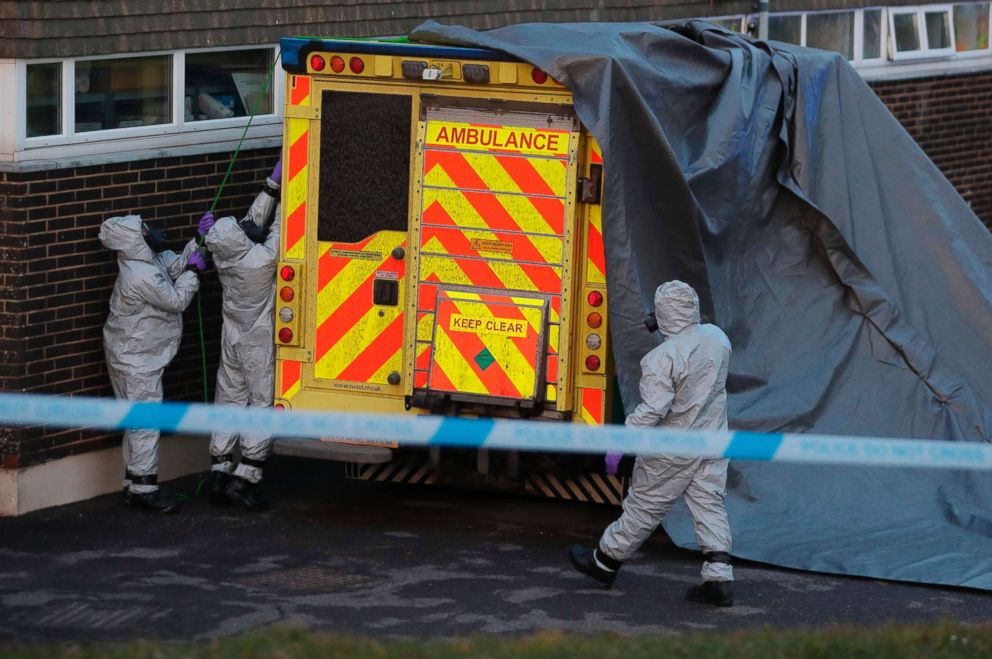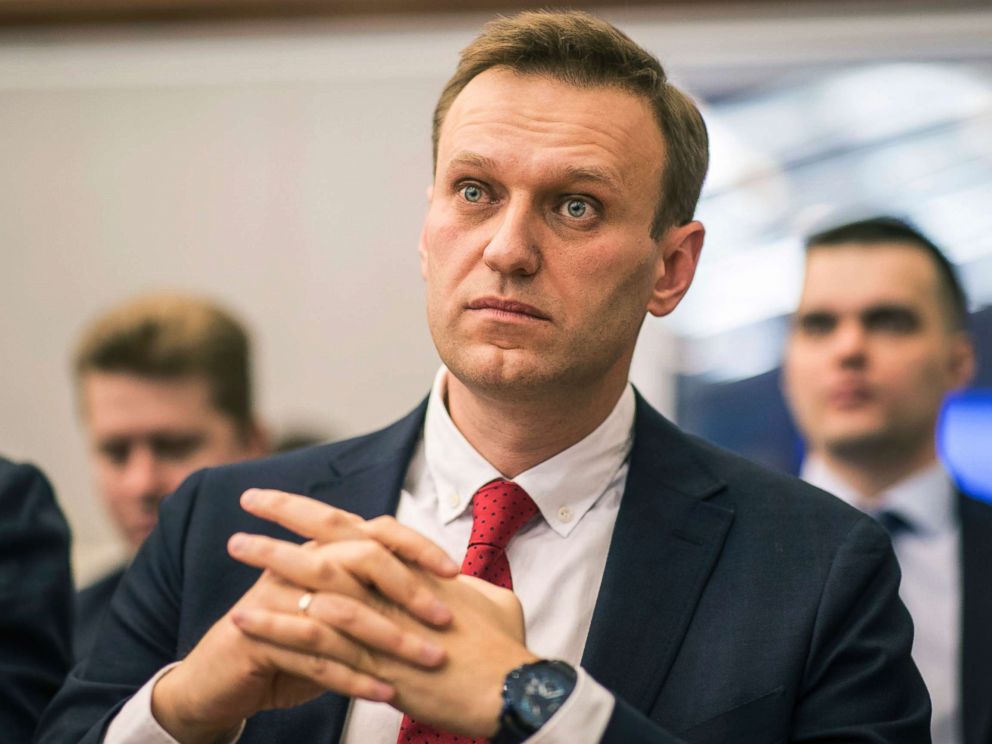Top Putin critic Navalny calls for UK to sanction oligarchs over spy poisoning
 Daniel Leal-Olivas/AFP/Getty Images
Daniel Leal-Olivas/AFP/Getty Images
WatchPutin critic suggests how to retaliate after former Russian spy was poisoned
As Britain weighs possible retaliatory actions against Russia over the
poisoning of a former spy in England last week, a top Kremlin opponent
has called for the U.K. to impose targeted sanctions against oligarchs
close to Vladimir Putin with assets in London.
Britain is considering its options after a chemical attack on Sergey
Skripal and his daughter that employed a military-grade nerve agent UK
officials said must have been produced in Russia. U.K. Prime Minister
Theresa May had given Russia until midnight Tuesday to explain how the
nerve agent, known as a "Novichok," came to be used in the small town of
Salisbury, or face retribution.
In an interview with ABC News on Tuesday, Alexey Navalny, an
anti-corruption activist seen as Putin's most-effective critic, said
that if it's proved conclusively that the Kremlin was behind the
poisoning, the British government should eschew "symbolic gestures" such
as a soccer World Cup boycott or banning Russian propaganda stations,
and instead target wealthy Putin allies in the U.K.
 Evgeny Feldman/AP
Evgeny Feldman/AP
"One scenario, as it seems to me, is Putin's comfortable scenario,"
Navalny said at the Moscow office of his organization, the
Anti-Corruption Foundation. That would mean "quite standard responses,"
Navalny said, such as diplomatic punishments or symbolic sanctions, that
he said Putin expects.
"There is a second option," he added, "that would really be painful for
Putin and his corrupt circle that consists of applying targeted
sanctions on those oligarchs and state officials whose families have
been based for a very long time in Great Britain."
British officials have suggested they're looking at a broad range of retaliatory actions, including diplomatic expulsions, fresh economic sanctions and cyberattacks, and the government has also made clear that it's considering sanctions against individual Putin allies, by imposing visa bans and possibly freezing assets.
May's midnight ultimatum passed, with Sergey Lavrov, Russia's foreign
minister, saying it will not respond to it until the U.K. provides
details of the nerve agent used. Officials in Moscow have lined up to
reject the British allegations as inventions meant to smear Russia, with
a foreign ministry spokeswoman calling them "fairy tales."
With her ultimatum deadline seeming to have passed without Russia
acquiescing, May is under pressure to respond toughly amid criticism the
U.K. failed to act strongly enough over a previous Russian-linked
poisoning, that of Alexander Litvinenko, a Russian intelligence officer
turned dissident who was murdered with a radioactive substance in London
in 2006. With Russia seen as mounting an increasingly aggressive
challenge to Western countries, there are calls for the U.K. to take a
harder line to make the Kremlin take notice.
Irking the Kremlin is an area Navalny has experience in. A former
lawyer, he came to prominence in Russia with investigations revealing
the alleged illegal wealth of senior officials and members of Putin's
circle. One of those, into the alleged illegal property empire of
Russia's prime minister, Dmitry Medvedev, prompted large scale street
protests last year. Recently, Navalny built a grassroots movement with
tens of thousands of followers, calling for fair elections and an end to
official corruption. Regularly jailed for holding rallies against the
Kremlin, he was barred from running for president against Putin in
elections, due to take place this week, over a fraud conviction he says
is trumped up.
Navalny has argued that the Kremlin's pressure points are the oligarchs
around it, the few dozen businessmen and friends of Putin who made
immense fortunes during his rule, often benefiting from state contracts.
The Kremlin will not, Navalny said, be phased by symbolic responses,
having got used to them after years of escalating confrontation with
Western countries. In particular, he said he is opposed to the proposal
to ban RT, the Kremlin-funded broadcaster formerly known as "Russia
Today" that has been accused of acting as a propaganda outlet. Putin
would be untroubled by such a ban, given RT is relatively little watched
in the UK, and it would allow the Kremlin to say censorship exists in
Western countries.
Such steps, Navalny, said just allowed Putin to "use them in his propaganda."
Instead, he added, the U.K. should take advantage of the concentration
of Putin allies' wealth in London. The UK has become a hub for rich
Russians under Putin, with large numbers of the country's elite owning
property there and educating their children in English schools.
Navalny said UK authorities should impose asset freezes and strip visas
from oligarchs close to the Kremlin who were enjoying lives in England,
saying he could name 20 figures to start with.
"It will lead to the creation of an anti-Putin coalition, one in the
shadows for now, inside the Putin establishment," Navalny said. "Up to
now, they have seen that Putin solves problems, Putin is able to do
whatever he wants —- to shoot down airplanes, to start wars, to lie in
every interview, in every conversation with world leaders -- but in a
remarkable way he gets away with everything."
"And here will be the first example," Navalny added, "if it will all be proved, where it leads to some kind of consequences."
Navalny gave the names of two figures he said the U.K. authorities should immediately target: Alisher Usmanov and Igor Shuvalov.
Usmanov is one of Russia's richest men, solidly invested in Britain,
where he owns the London soccer club Arsenal FC. The Kremlin has
reportedly tapped him when in need of cash for projects; Usmanov even
once paying the wages of the coach of Russia's national soccer team.
Shuvalov, is an influential Russian first deputy prime minister, who
Navalny has previously accused of concealing vast wealth abroad. Navalny
has previously alleged that Shuvalov owns an $18 million,
5,380-square-foot penthouse in central London, despite having an annual
government salary of only around $17,000.
Shuvalov has previously said his income declarations are in order and
his earnings are entirely legal. Usmanov has sued Navalny over
allegations he was part of the bribery involving prime minister
Medvedev. Last year, Usmanov released a video in which he told Navalny,
"I spit on you."
Enthusiasm for targeting assets belonging to Kremlin-linked figures in
London has been expressed in British official circles since Skripal’s
poisoning. In particular, there have been calls for Britain to introduce
a so-called Magnitsky Act, legislation similar to that already in the
U.S. that imposes visa bans and asset freezes on Russians implicated in
human-rights abuses.
The Act is named after Sergey Magnitsky, a lawyer murdered after he
uncovered a $230 million tax fraud involving Russian officials. The U.K.
government has also suggested it's considering applying recently
introduced legislation allowing for freezes of wealth suspected to be
corrupt.
Navalny, however, said he feared the U.K. "unfortunately" was likely to
opt for "the route of symbolic gestures" in the latest clash. A large
number of individuals identified as close to Putin are already under
European Union and U.S. Treasury sanctions imposed over Russia's seizure
of Crimea from Ukraine in 2014. But Navalny argued that these have been
relatively toothless, claiming that most of Putin's key allies still
own property in Europe and the U.S.
“While about these sanctions there are a lot of conversations," Navalny
said, "they unfortunately have no practical influence on what is
happening."
No comments